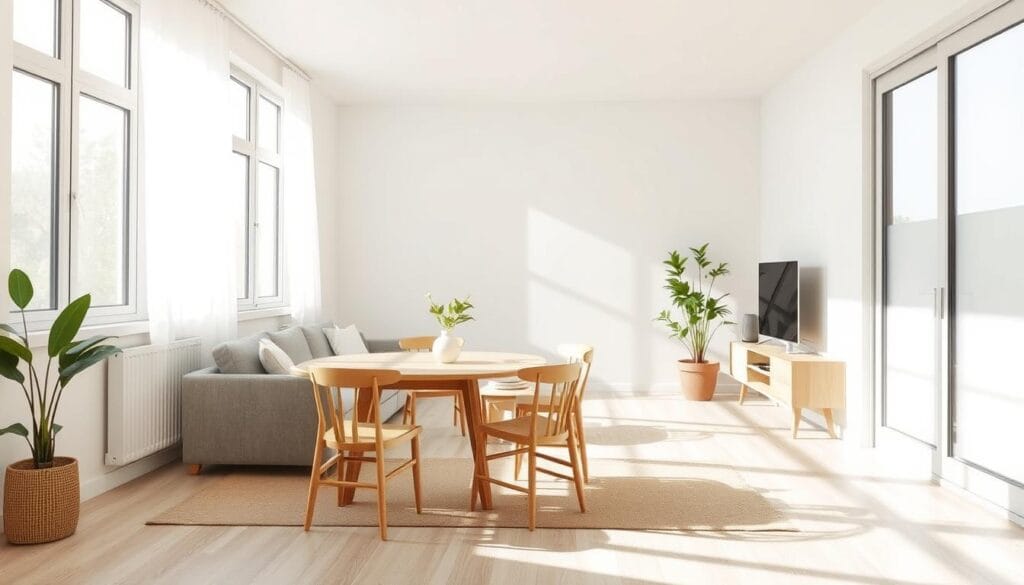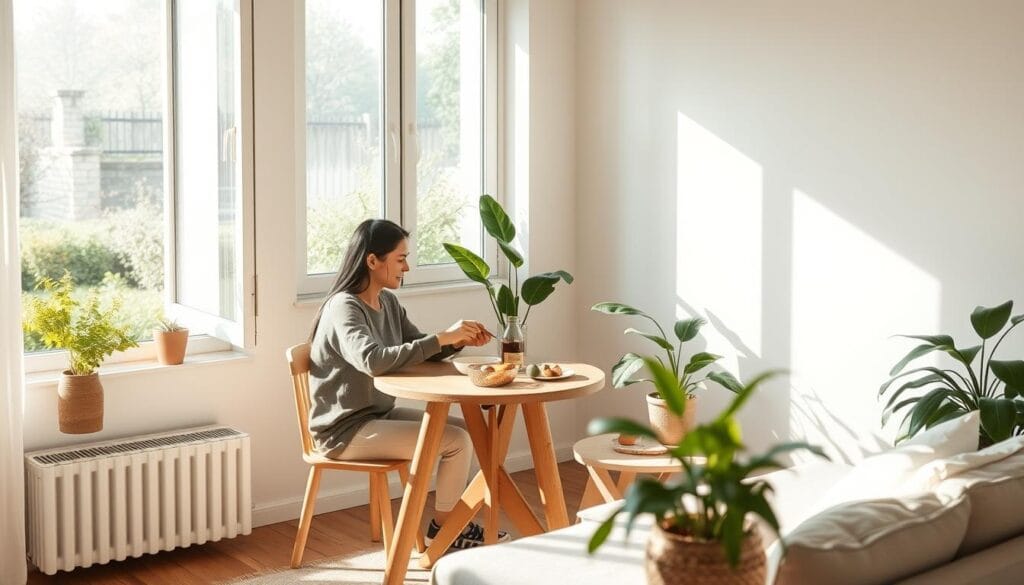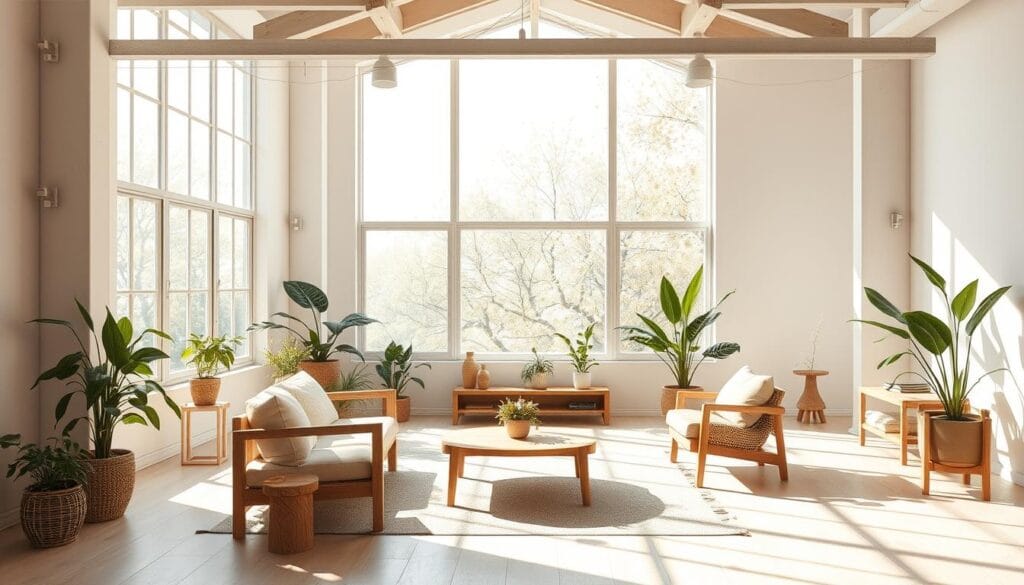In today’s world, we’re surrounded by too much stuff and digital noise. Minimalist living is becoming popular in the U.S. as a way to simplify life. It helps fight the stress and anxiety of modern times.
Living minimally means focusing on what’s truly important. It’s about finding happiness in the simple things. By getting rid of too much stuff and distractions, you feel free. This leads to clearer thinking, less stress, and better choices.

Key Insights
- Minimalist living can lead to improved mental well-being and reduced stress
- Decluttering physical and mental spaces promotes clarity and mindfulness
- Embracing simplicity fosters better decision-making and financial freedom
- Minimalist living supports sustainable living and environmental consciousness
- The psychological benefits of minimalism can enhance overall life satisfaction
Understanding the Core Principles of Minimalist Living
Minimalist living is more than just looks. It’s about living with purpose and joy in simplicity. Let’s dive into its history and key elements to understand this life-changing philosophy.
Defining Modern Minimalism Beyond Aesthetics
Minimalist design is popular, but it’s just the start. Modern minimalism is about living intentionally. It means choosing only what’s essential, freeing up space for what truly adds value to your life.
The Historical Evolution of Minimalist Lifestyle
Minimalism’s roots are in movements like the Bauhaus and Japanese wabi-sabi. It has grown into a way of life that values simplicity, function, and mindfulness in every area.
Key Elements of Minimalist Philosophy
- Intentional Living: Minimalists pick what they own and do, focusing on what’s important and good for them.
- Prioritization: They learn to tell the difference between what’s needed and what’s not. This helps them use their time and energy wisely.
- Emphasis on Experiences: They value experiences over stuff, aiming for a life filled with growth and memorable moments.
By following these principles, people can find clarity, purpose, and happiness. It leads to a more meaningful and intentional life.
What Are the Psychological Benefits of Minimalist Living?
Living a minimalist life can bring many mental health benefits. It helps you feel more emotionally well and psychologically strong. By owning less, you feel free and clear in many areas of your life.
One big psychological advantage is less anxiety and stress. With fewer things around, your mind relaxes from constant noise. This calm helps you focus better, make decisions easier, and enjoy life more.
Minimalism also helps you know yourself better. Letting go of stuff lets you connect with what’s truly important. You learn more about your mental health benefits and what gives your life meaning.
Studies show that minimalists are happier and more grateful. They feel less burdened and more free to enjoy life’s true treasures. This way of living brings psychological advantages that make every day better.
| Psychological Benefit | Description |
|---|---|
| Reduced Anxiety and Stress | Minimalist living can help alleviate feelings of overwhelm and create a sense of mental calm. |
| Increased Focus and Clarity | By decluttering your surroundings, you can cultivate a more focused and attentive mindset. |
| Enhanced Self-Awareness | Letting go of material possessions can foster a deeper understanding of your values and priorities. |
| Improved Life Satisfaction | Minimalist living has been linked to higher levels of overall happiness and gratitude. |
How Decluttering Your Space Transforms Mental Clarity
Living a minimalist lifestyle is more than just looks. It deeply affects your mental health. Decluttering your space can greatly improve your mental clarity. It helps you focus better and think more clearly.
The Connection Between Physical and Mental Space
Our surroundings greatly affect our minds. Cluttered spaces make our minds feel the same. But, a clean and organized space brings calm and focus, making our thoughts clearer.
Breaking Free from Material Attachments
Minimalist living is about letting go of things you don’t need. This act of detachment frees you from emotional burdens. It makes room for what’s truly important, improving your mental clarity.
Creating Room for Mindfulness and Focus
A clean space looks good and helps you stay focused. It reduces distractions, making it easier to practice mindfulness and focus. This leads to better mental health and mental clarity.
Embracing minimalist living changes your life. It shows how decluttering your space can improve your mental clarity. You’ll find more focus, mindfulness, and organization, leading to a more meaningful life.
Stress Reduction Through Simplified Living
In today’s fast-paced world, living simply is key. It greatly reduces stress. By cutting down on clutter and focusing on what’s important, you can feel much less stressed.
Too many things and commitments can make you feel overwhelmed. This leads to more anxiety and less happiness. But, living simply helps you let go of the unnecessary. It lets you focus on what truly matters, bringing you peace and simplicity.
To manage stress better through simple living, try these tips:
- Clear out your space by getting rid of things that don’t bring you joy or serve a purpose.
- Streamline your daily life by cutting out activities that waste your time and don’t make you happy.
- Stay in the moment by practicing mindfulness. This helps you avoid worrying about the future or past.
- Choose a minimalist lifestyle by reducing your wardrobe, cutting down on digital distractions, and valuing experiences over things.
By using these strategies, you can find peace and clarity. This leads to better mental focus, smarter choices, and a happier life.
| Benefit | Description |
|---|---|
| Reduced Stress Levels | Living simply removes distractions and clutter, helping you focus on what’s important. |
| Increased Mindfulness and Focus | By simplifying your life, you can stay present and focused, improving your mental clarity. |
| Enhanced Well-being | A simple lifestyle can lead to less stress and more happiness, improving your overall well-being. |
Enhanced Decision-Making in a Minimalist Environment
In today’s world, making choices can be overwhelming. But, living simply can make decision-making easier. By cutting down on choice overload, minimalism helps you think more clearly and feel more confident in your choices.
Freedom from Choice Overload
Minimalist living frees you from too many choices. Too many options can make your mind feel heavy and stressed. By simplifying your space, you reduce distractions and make better decision-making easier.
Developing Decisive Thinking Patterns
Living simply helps you focus on what’s important. This clear thinking helps you make quicker, better choices. Over time, you’ll get better at making decisions and feel more confident.
Building Confidence in Daily Choices
As you get used to simpler choices, you’ll feel more confident. This confidence can grow in many areas of your life. A minimalist lifestyle teaches you to trust yourself and make choices that reflect your values, leading to more happiness and fulfillment.
Improved Relationships and Social Connections
Living a minimalist lifestyle can deeply impact your social life. It simplifies your life, making room for more time with family and friends. This way, you can enjoy deeper connections with those you love.
Minimalism helps you build stronger, more meaningful relationships. It frees you from the clutter of stuff and constant busyness. This lets you focus on the people who matter most, leading to better communication and stronger bonds.
Also, minimalism encourages a sense of community and social connection. It lets you ditch the need to impress others. This way, you can form real relationships based on shared values and experiences.
| Benefits of Minimalist Living for Relationships | Description |
|---|---|
| More Quality Time | Minimalism frees up your schedule, allowing you to spend more quality time with loved ones. |
| Improved Communication | With fewer distractions, you can engage in deeper, more meaningful conversations. |
| Stronger Emotional Bonds | By focusing on the people in your life, you can develop stronger, more resilient relationships. |
| Sense of Community | Minimalism can foster a sense of belonging and connection within your social circles. |
In the end, minimalist living can greatly improve your social connections and meaningful relationships. It simplifies your life, making room for more quality time and meaningful interactions with those you care about.

Financial Freedom and Its Impact on Mental Well-being
Living minimally doesn’t just clean up your home. It can also bring you financial freedom and better mental health. By avoiding the trap of too much spending, you can build good money habits. This leads to less stress about money and more peace of mind.
Breaking the Cycle of Consumerism
Minimalism helps you think differently about stuff. Instead of always chasing new things, you focus on what’s truly important. This way, you avoid debt and live within your means. It leads to financial stability and a happier mind.
Building Sustainable Financial Habits
Living minimally often means being smart with money. By cutting back on unnecessary spending, you can save for the future. This not only makes you feel secure but also improves your money mindset. It reduces stress and gives you control over your finances.
Reducing Money-Related Anxiety
Many people turn to minimalism for financial freedom. Getting rid of debt and unnecessary spending lowers stress. This lets you focus on what’s truly important, leading to a more balanced life.
Embracing minimalism can help you manage your finances better. This leads to a happier, more fulfilling life.
Sustainable Living and Environmental Peace of Mind
Living simply is linked to caring for the environment. By using less and wasting less, you help the planet. This makes you feel good about your choices.
Minimalism teaches us to value experiences more than things. This helps us live more sustainably. By choosing experiences over stuff, you think more about your impact on the planet.
- Minimizing waste and embracing a zero-waste lifestyle
- Prioritizing eco-friendly and sustainable products
- Reducing energy and water usage through thoughtful living
- Supporting local and ethical businesses that prioritize sustainability
Living green makes you feel closer to nature. It boosts your mental health, giving you a sense of purpose. You’ll know you’re helping the planet for the future.

Minimalism and green living are a perfect match. They help you grow personally while protecting the environment. As you clear out your space, you’ll also clear your mind. This leads to a deeper love for nature and peace of mind.
Conclusion
Discovering a minimalist lifestyle brings many psychological benefits. It improves your mental clarity and focus. It also reduces stress and helps you make better decisions.
By getting rid of unnecessary stuff, you make room for growth and better relationships. You also feel more financially free. Plus, living sustainably brings peace of mind, which is good for your mental health.
Starting a minimalist journey is not about being perfect. It’s about finding a balance that fits your life. Focus on what’s important to you. Let the minimalist benefits, lifestyle change, personal growth, and mental health improvements happen naturally. Taking the first step towards minimalism can lead to a more mindful and fulfilling life.




